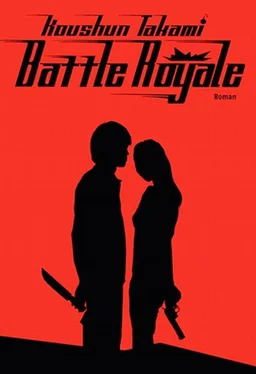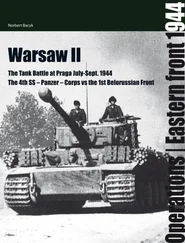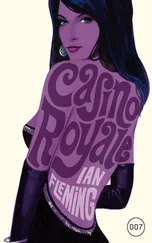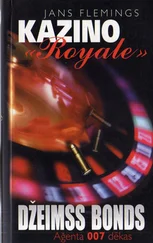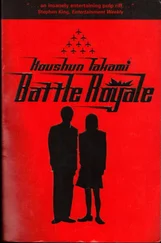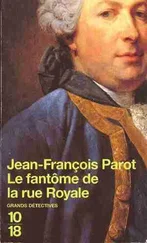The reporter continued, but Shuya was too preoccupied with the following to listen.
It was a short clip subtitled, “Winner Shogo Kawada— Found Dead.” Under normal circumstances, they would have only shown a generic subtitle, “Male Student Winner,” and the short segment would have only been broadcast on the Kagawa Prefecture local news. Shuya and Noriko watched the news at the Kobe doctor’s house several times, but they only showed Shogo’s photo. This was the first time they saw this clip.
Held between the soldiers, Shogo stared into the camera. Then—
At the end of the clip, which lasted approximately ten seconds, he grinned and raised his right fist with his thumb pointing up.
The crowd staring at the screen sounded dismayed. They probably thought Shogo was proud about his victory.
But of course that wasn’t it at all , Shuya thought as he watched the screen return to the image of the reporter.
Was it a message to him and Noriko? Did he already know he was going to die when he stood in front of the government camera? Or was it just a display of his unique sense of irony?
I’ll never know. Just as Shogo once said.
Then Shuya and Noriko’s closeup photos were displayed again.
“Any sightings should be reported to—”
“Let’s go Noriko. We have to hurry,” Shuya whispered. He took her left hand with his right hand. They turned away from the screen and began walking.
“Shogo told me,” Noriko said as they walked, holding hands, “before you came back… when you were with Yukie’s group, he told me something.”
Shuya tilted his head and looked at Noriko.
Noriko looked up at Shuya. Her eyes covered by the brim of her hat were moist. “He said he was glad to have such good friends.”
Shuya looked up and nodded. He just nodded.
They let a group of six or seven students pass by, and then they started walking again. Shuya said, “Noriko. We’ll always be together. I promised Shogo.”
Noriko seemed to be nodding.
“For now we escape. But some day I’m going to tear this country down. I’m still keeping the promise I made to Shogo. I want to tear it down for Shogo, for you, for Yoshitoki, for everyone. Will you help me when the time comes?”
Noriko squeezed Shuya’s hand and replied assertively, “Of course, I will.”
They departed from the crowd. They stood in front of a ticket dispenser. Noriko looked up at the display above the ticket machine, took out some change, and counted it out. Then she stood in line in front of the ticket machine to buy their tickets.
Shuya stood still, waiting for Noriko’s turn to come. It came immediately. She put the coins into the coin slot.
Shuya casually looked over to his left.
He squinted his eyes. There was the entrance to the station concourse, and he could make out the Osaka high-rise district, just beyond the road where taxis and cars were passing each other. A tall, uniformed man emerged from this background, heading straight towards them. He skillfully dodged the flow of pedestrians and made his way toward Shuya.
It was a policeman’s uniform. There was a gold peach insignia shining at the center of his cap.
With his right hand Shuya slowly reached for the Beretta M92F tucked in the back of his jeans as he looked for an escape route. There was a road at the entrance opposite the policeman. If they could get there, they could grab a cab—
Shuya whispered to Noriko, who returned with their tickets, “Forget about the train, Noriko.”
Noriko understood. She quickly turned and opened her eyes wide after seeing the policeman.
“That way,” Shuya said. The policeman came running at them.
“We have to run, Noriko! Run as fast as you can!” he said. As they dashed out, Shuya thought, hey, doesn’t that sound familiar.
He glanced behind him. The police officer held out his gun. Shuya pulled out his Beretta. The officer shot immediately. BANG BANG. Two sweeping shots, but luckily no one in the crowd, including Shuya and Noriko, was hit. There were cries though, as some fell to the ground for cover, while others—having no idea where the gunfire came from—scattered in random directions. The officer, his gun down, ran toward them again, but then crashed into a fat woman carrying groceries, and clumsily fell. The woman fell too, and her bag of vegetables for dinner tumbled and slid on the floor.
That was all Shuya saw. He was looking ahead now.
As he ran next to Noriko, a thought suddenly occurred to him. The screaming, their hasty footsteps, and the officer warning them to stop all receded as his mind was occupied with this thought.
It might have been inappropriate. And besides… he’d ripped it off. Oh, man.
But still he thought this:
Together Noriko we’ll live with the sadness.
I’ll love you with all the madness in my soul.
Someday girl I don’t know when
we’re gonna get to that place.
Where we really want to go
and we’ll walk in the sun.
But till then tramps like us
baby we were born to run.
The screaming and yelling swelled back, returning with the sound of Noriko’s heavy breathing and his heart thumping.
We’re still on the run. That’s for sure.
Right on. This time we’re on.
And we won’t stop till we win.
Now, once again, “2 students remaining.”
But of course they’re part of you now.
Koushun Takami was born in 1969 in Amagasaki near Osaka and grew up in Kagawa Prefecture of Shikoku, where he currently resides. After graduating from Osaka University with a degree in literature, he dropped out of Nihon University’s liberal arts correspondence-course program. From 1991 to 1996 he worked for the prefectural news company Shikoku Shinbun, reporting on various fields, including politics, police reports, and economics. Although he has an English teaching certificate, he has yet to visit the United States.
Battle Royale, completed after Takami left the news company, was rejected in the final round of a literary competition sponsored by a major publisher due to the critical controversy it provoked among jury members. With its publication in Japan in 1999, though, Battle Royale received widespread support, particularly from young readers, and became a bestseller. In 2000, Battle Royale was serialized as a comic and made into a feature film. Mr. Takami is currently working on his second novel.
Yuji Oniki is a writer and translator.
© 1999 Koushun Takami. English translation
© 2003 by Yuji Oniki/VIZ Media, LLC.
All rights reserved.
First published in Japan by Ota Shuppan in 1999
“Born To Run” by Bruce Springsteen.
Copyright © 1975 Bruce Springsteen (ASCAP).
All rights reserved. Reprinted by permission.
Excerpt from HOMAGE TO CATALONIA by George Orwell, copyright 1952 and renewed 1980 by Sonia Brownell Orwell, reprinted by permission of Harcourt, Inc.
Editorial acknowledgment: Tomo Machiyama
No unauthorized reproduction of any portion of this book is permitted without written consent of the publisher. The stories, characters, institutions, and incidents mentioned in this book are entirely fictional. Any resemblance is purely coincidental.
Published by VIZ Media, LLC
295 Bay Street
San Francisco, CA 94133
Printed in the U.S.A.
ISBN 1-56931-778-X
First printing, February 2003
